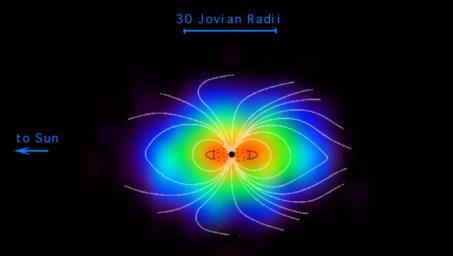
|
Jupiter’s Magnetosphere Made Visible
- Click the image above for a larger view
- Full-Res JPEG (1288 x 728) (48.9 kB)
- Full-Res TIFF (1288 x 728) (1.0 MB)
Caption:
The vast magnetosphere of charged particles whirling around Jupiter, normally invisible, can be imaged by a new type of instrument aboard NASA's Cassini spacecraft and is seen here.
Three features are sketched in for context: a black circle showing the size of Jupiter, lines of Jupiter's magnetic field, and a cross-section of the Io torus, a doughnut-shaped ring of charged particles that originate from volcanic eruptions on Jupiter's moon Io and circle Jupiter at about the orbit of Io.
Jupiter's magnetosphere is the largest object in the solar system. If it glowed in wavelengths visible to the eye, it would appear two to three times the size of the Sun or Moon to viewers on Earth.
Background Info:
Cassini's ion and neutral camera detects neutral atoms expelled from the magnetosphere, deriving information about their source. This image was taken shortly after Cassini's closest approach to Jupiter, about 10 million kilometers (6 million miles) from the planet on Dec. 30, 2000. For more information about the Saturn-bound spacecraft and its observations of Jupiter, see the Cassini home page, http://saturn.jpl.nasa.gov .
Cassini is a cooperative project of NASA, the European Space Agency and the Italian Space Agency. The Jet Propulsion Laboratory, a division of the California Institute of Technology in Pasadena, manages the Cassini mission for NASA's Office of Space Science, Washington, D.C.
Cataloging Keywords:
| Name | Value | Additional Values |
|---|---|---|
| Target | Jupiter | Io |
| System | Jupiter | |
| Target Type | Planet | Satellite |
| Mission | Cassini-Huygens | |
| Instrument Host | Cassini Orbiter | |
| Host Type | Orbiter | |
| Instrument | ||
| Detector | ||
| Extra Keywords | Color, Magnetosphere, Volcano | |
| Acquisition Date | ||
| Release Date | 2002-02-27 | |
| Date in Caption | ||
| Image Credit | NASA/JPL/Johns Hopkins University Applied Physics Laboratory | |
| Source | photojournal.jpl.nasa.gov/catalog/PIA03476 | |
| Identifier | PIA03476 | |
